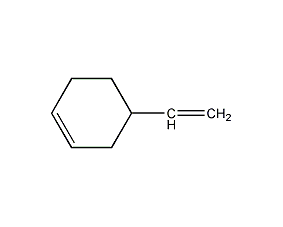4-Vinyl-1-cyclohexene 4-Vinyl-1-cyclohexene


Structural formula
| Business number | 02HT |
|---|---|
| Molecular formula | C8H12 |
| Molecular weight | 108.18 |
| label |
4-ethylene-1-cyclohexene, 4-Vinylcyclohexene, 4-vinyl-1-cyclohexene, indigo, Wish you indigo, 4-ethylene-1-cyclohexene, C6H9CH=CH2, 4-Vinyl-1-cyclohexene, 4-Vinylcyclohexene, 4-Vinylcyclohexene-1, (Vch,butadienedimer), 1,2,3,4-Tetrahydrostyrene, 1-Cyclohexene, 4-vinyl-, 1-Vinyl-3-cyclohexene, 1-Vinylcyclohex-3-ene |
Numbering system
CAS number:100-40-3
MDL number:MFCD00001576
EINECS number:202-848-9
RTECS number:GW6650000
BRN number:1901553
PubChem number:24889964
Physical property data
1. Properties: colorless liquid.
2. Density (g/mL, 20℃): 0.83
3. Relative vapor density (g/mL, air=1): 3.76
4. Melting point (ºC): -108.9
5. Boiling point (ºC, normal pressure): 128.5
6. Relative density (20℃, 4℃): 0.8296
7. Refractive index: 1.4639
8. Flash point (ºC): 16
9. Gas phase standard heat of combustion (enthalpy) (kJ·mol– 1): -4928.1
10. The gas phase standard claims heat (enthalpy) (kJ·mol-1): 65.1
11. Vapor pressure (mmHg, 25ºC): 10.2
12. Saturated vapor pressure (kPa, 38ºC): 3.44
13. Liquid phase standard combustion heat (enthalpy) (kJ·mol-1): -4889.8
14. The liquid phase standard claims heat (enthalpy) (kJ·mol-1): 26.8
15. Critical pressure (KPa): Undetermined
16. Log value of oil-water (octanol/water) distribution coefficient: Undetermined
17. Explosion upper limit (%, V/V): Undetermined
18. Lower explosion limit (%, V/V): Undetermined
19. Solubility: Soluble in most organic solvents.
Toxicological data
1. Acute toxicity: Rat oral LD5O: 2563mg/kg
Rabbit transdermal LD5O: 16640mg/kg
Mouse inhalation LC50: 27000mg/m3, 1 hour
Ecological data
This substance is harmful to the environment, and special attention should be paid to atmospheric pollution.
Molecular structure data
1. Molar refractive index: 38.05
2. Molar volume (cm3/mol): 120.6
3. Isotonic specific volume (90.2K ): 286.3
4. Surface tension (dyne/cm): 31.7
5. Dielectric constant: 2.44
6. Dipole moment (10-24cm3):
7. Polarizability: 15.08
Compute chemical data
1. Reference value for hydrophobic parameter calculation (XlogP): 2.8
2. Number of hydrogen bond donors: 0
3. Number of hydrogen bond acceptors: 0
4. Number of rotatable chemical bonds: 1
5. Number of tautomers: none
6. Topological molecule polar surface area 0
7. Number of heavy atoms: 8
8. Surface charge: 0
9. Complexity: 101
10. Number of isotope atoms: 0
11. Determine the number of atomic stereocenters: 0
12. Uncertain number of atomic stereocenters: 1
13. Determine the number of chemical bond stereocenters: 0
14. Number of uncertain chemical bond stereocenters: 0
15. Number of covalent bond units: 1
Properties and stability
Avoid contact with strong oxidants and acids.
Storage method
Usually products contain polymerization inhibitors. Store in a cool, ventilated warehouse. Keep away from fire and heat sources. The storage temperature should not exceed 30℃. They should be stored separately from oxidants and acids, and avoid mixed storage. It should not be stored in large quantities or for long periods of time. Use explosion-proof lighting and ventilation facilities. It is prohibited to use mechanical equipment and tools that are prone to sparks. The storage area should be equipped with emergency release equipment and suitable containment materials.
Synthesis method
None yet
Purpose
Used in polymer manufacturing and organic synthesis.
